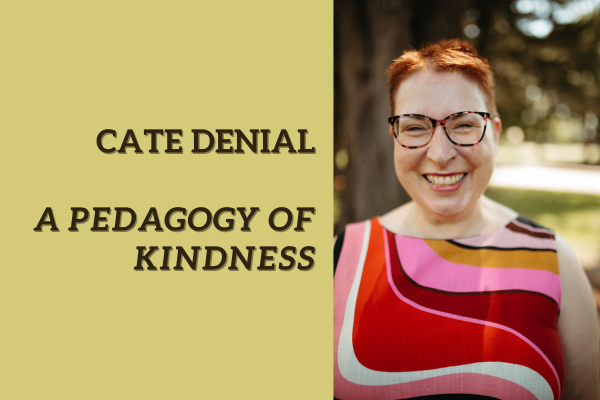by Emily Pitts Donahoe, associate director of instructional support
This past Wednesday, CETL was thrilled to host guest speaker Dr. Cate Denial, the Bright Distinguished Professor of American History and Director of the Bright Institute at Knox College. Cate is the principal investigator on a Mellon Foundation grant exploring “Pedagogies, Communities, and Practices of Care in the Academy After COVID-19.” She is also the author of a forthcoming book titled A Pedagogy of Kindness. In short, she has a lot of wisdom to share about compassionate teaching.
Academia and Kindness
Cate began her talk by defining kindness, both by what it is and what it is not. Kindness, Cate stresses, is not the same thing as “niceness.” Being “nice” often means lying about or minimizing the deep wounds caused by precarity, power imbalances, burnout, and other toxic elements of academia. Instead, practicing kindness means being honest about the challenges we face and the ways in which academia has been, and continues to be, hostile toward so many marginalized populations. Kindness also involves accountability, requiring us to take responsibility for the impact of our mistakes and to prioritize the pursuit of justice over the pursuit of comfort. Finally, kindness is a discipline that we must practice even when we don’t feel particularly compassionate.
The academy, as we know, is often unkind. It socializes us into distrust, encouraging competition over collaboration, perpetuating exclusion, and promoting antagonism, especially toward our students. Cate shared her own story about how this distrust harmed her experience as a graduate student and early career faculty member, and the ways she learned to do things differently. This involved critically questioning the pedagogical choices she made, with one key question in mind: “Why not be kind?”
A Pedagogy of Kindness
Cate’s “pedagogy of kindness” has three main tenets:
Justice: Cate shared some pretty stunning numbers about the challenges our students are facing. For example, almost half of undergraduates in a recent study experienced housing insecurity while seeking their degree, and a third experienced food insecurity. Many students—especially our disabled, LGBTQIA+, and BIPOC students—are navigating academic environments that were not designed with their needs and identities in mind.
In light of these challenges, justice asks us to question our assumptions about students, to give them the benefit of the doubt, and to get rid of the hoops that stand in their way.
Believing Students: When a student says that they’re facing a challenge that prevents them from engaging with our class, we could either start from a position of suspicion or from a position of belief and support. Cate advocates for cultivating trusting relationships with students: it’s better to be occasionally taken in by student dishonesty than to risk harming students who are genuinely in crisis.
Believing in Students: Believing in students means investing in the idea that all students are capable of success with the proper support and that students really want to learn and grow. In practice, that means two things: rethinking our course materials with trust in mind and collaborating with students in their learning.
When Cate critically reflected on her course materials a few years ago, she discovered that she was designing for students she didn’t trust; that she was projecting an image of unassailable authority and unapproachability; and that her materials were not accessible to a broad range of students. She redesigned her syllabi and assignment sheets in ways that made the course more transparent and welcoming. She also redesigned her assessments to allow students to demonstrate their learning in a variety of ways—not just in writing.
Additionally, her revisions made opportunities for students to contribute to, and even co-create, her course. This means that students have input on the course policies, assignments, and even grading and that they complete authentic assessments that have meaning beyond the classroom. Cate encouraged attendees to find similar ways to be kind to the students in their own courses.
Being Kind to Yourself
Finally, Cate emphasized that students should not be the only recipient of your kindness. You can be kind to yourself in a lot of different ways, but perhaps the most important are by setting boundaries and giving yourself space to rest and grow—not only in your teaching but also in your life outside of work.
We’re grateful to Cate for sharing her time and wisdom with us last week! To learn more about Cate’s work, you can follow her on Twitter and Bluesky or visit https://catherinedenial.org/. Be on the lookout for A Pedagogy of Kindness, forthcoming July 2024!
